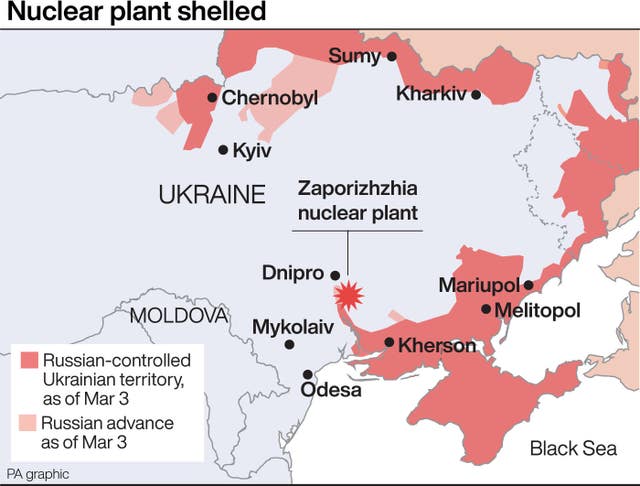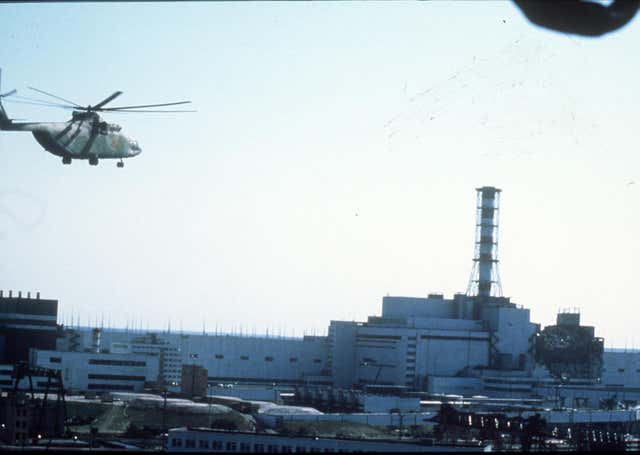Ukraine power plant attack unlikely to cause nuclear disaster – experts
Russian shelling of the Zaporizhzhia plant was probably not intended to trigger a meltdown, experts have said.

Russia’s shelling of a nuclear power station in Ukraine was unlikely to trigger a Chernobyl-style nuclear disaster, experts have said, though Moscow’s motives remain unclear.
A fire broke out at the Zaporizhzhia nuclear power plant – the largest in Europe – after it was shelled in the early hours of Friday.
The International Atomic Energy Agency (IAEA) later said a Russian projectile hit a training building that was not part of a reactor, causing a localised blaze that was later extinguished.
The Russian military has taken control of the Zaporizhzhia plant but the safety systems of the site’s six reactors have not been affected and there has been no release of radioactive material, the IAEA said.
Malcolm Grimston, an honorary senior research fellow at Imperial College London’s centre for energy policy and technology, said the small-scale weaponry used in the attack suggested it was not Russia’s intention to cause a radiological incident.
He told the PA news agency: “If one wanted to destroy a nuclear power station, which in itself will be an enormous task, the level of artillery that will be necessary would just be of a different order from what we were seeing last night.
“So it’s much more consistent at least at this stage with them wanting to take a facility that happened to be a nuclear facility in that area, but not to cause a radiological incident.”
Causing a nuclear disaster is not in Russia’s interest if its long-term aim is to annex Ukraine and integrate it into the Russian economy and polity, Mr Grimston argued.
He added: “These power stations are an enormous asset; Ukraine gets more than half of its electricity from nuclear power.
“You would expect the Russians to want to maintain that because if they’re going to run it as part of Russia, it will still need energy.”
Russia also operates 38 of its own reactors that it would not want to undermine, he said.
Mr Grimston added: “So in pretty much any sensible world, you would not expect this to be a disaster in the making.
“The problem is, I think, we still need to know what Russia’s ultimate aim is for Ukraine, because if it got into the position of deciding it just wanted to lay Ukraine to waste, then the calculation might change at that point.”
Dr Patricia Lewis, director of the international security programme at Chatham House, said the shelling of the plant could have been an accident or a scare tactic.
She told PA: “It could be just what happens in war, where you have a lot of firing and one of the shells goes into a building that it wasn’t intended to go into.
“It could be trying to scare everybody, and a deliberate attack on that particular building.
“It went on fire, but there was no radioactive material in there, but it’s a reminder of what could happen if they decided to attack a different part of the power station.
“Clearly we’re not dealing with people that we would interpret as rational and certainly not ones who care two figs about the people of Ukraine or even their own people.”
Russian forces have also seized control of the defunct Chernobyl nuclear plant, the site of the world’s worst nuclear disaster.
Dr Lewis said Moscow’s motives for taking over the sites could be linked to its claims of a nuclear threat emanating from Ukraine.

She said: “One of the fears I’ve had when they attacked Chernobyl to start with was that they might be trying to say that Ukraine is developing nuclear weapons at these plants and plant false information and therefore further justify their attack on the grounds that they’re not only, as they call it, denazifying and demilitarising, that they’re also denuclearising.”
Dr Amalendu Misra, senior lecturer in international politics and peace studies at Lancaster University, believes the Kremlin has long planned to seize the power plants as strategic assets.
He told PA: “Given Ukraine’s overwhelming dependence on nuclear power, if it controls these facilities, these stations, then it can bring the country to grind to a halt, everything will stop slowly.
“It’s kind of taking the oxygen out of the Ukrainian everyday existence.”
It also gives Moscow the ability to “blackmail” the West and Ukraine, he said.
“The West is in a sticky situation where Moscow can actually introduce a nuclear winter in Europe without exploding a nuclear bomb through this tacit target on Ukraine’s nuclear power plants,” Dr Misra added.
Experts have said the chances of explosion, nuclear meltdown or radioactive release are far lower at the Zaporizhzhia nuclear plant than at Chernobyl due to its modern design.

Reactor number four at the Chernobyl plant exploded and caught fire in 1986, shattering the building and spewing radioactive material high into the sky.
Even 36 years later, radioactivity is still leaking from history’s worst nuclear disaster.
At Zaporizhzhia, pressurised water reactors are housed inside robust concrete containment buildings and are protected from outside shocks.
They also do not have graphite cores which could be set alight like Chernobyl was.
But there are still concerns that fighting could disrupt vital cooling systems, which could lead to a disaster similar to that of Japan’s Fukushima plant in 2011, when a tsunami disabled the cooling of three reactors.
“Nuclear reactors need to be cooled all the time, and so as we saw with Fukushima, if you lose the external power supply, and in that case because of a tsunami, then you can go into meltdown,” Dr Lewis said.
Mr Grimston said that regardless of the Kremlin’s motives for the attack, it constitutes a war crime.
“It is a war crime to attack an operating nuclear facility, because however careful – I’m not sure there was a great deal of care taken here – but however careful you are, inevitably you can’t be sure that weaponry is not going to go astray,” he said.





